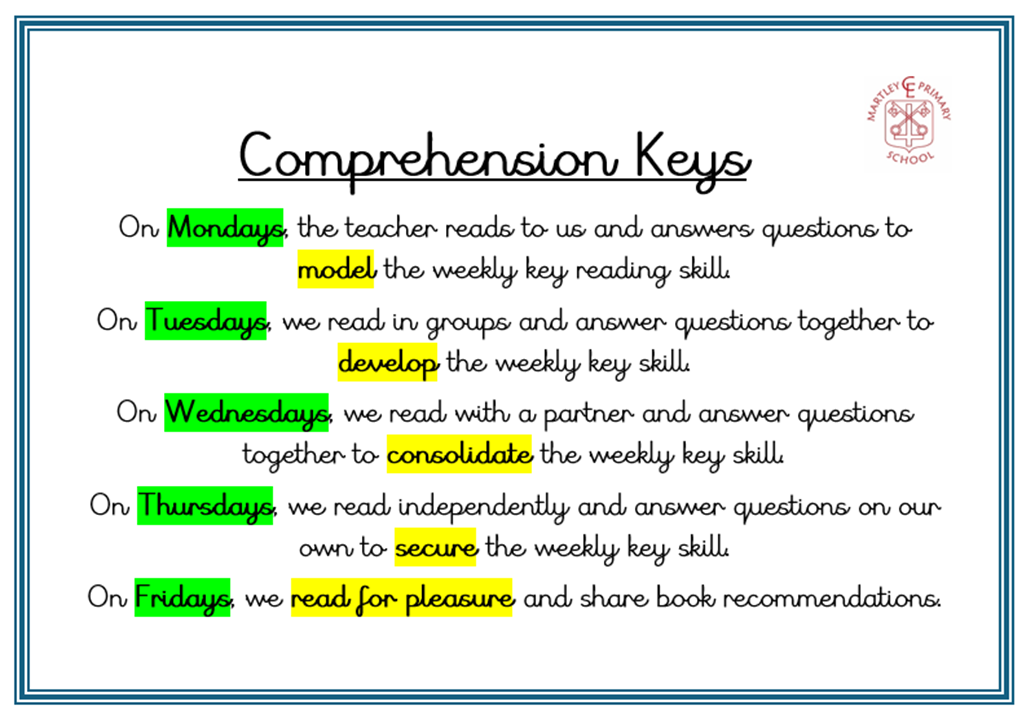English
In line with the DfE Reading Framework July 2023, children are encouraged to develop a true reading for pleasure culture through improving their comprehension and fluency. At Martley, the children are exposed to a range of texts to promote this love of reading and writing. As part of their daily reading, it is recommended that children re-read a text so that they can gradually increase the number of words they can read at a glance.
Phonics
Phonics is taught every day in KS1 following the Read Write Inc scheme. The children are given a phonetically decodable book to take home and we encourage them to read this two to three times before changing it. These books are also expected to come back to school every day so that adults can read with the children. The sounds children learn are then displayed for the children to use on a daily basis.
Class Readers
Class readers are used to inspire children and in turn lead to improved writing outcomes. They are focussed on quality literature and carefully selected to include key themes such as environmental awareness, diversity and inclusion, stories set in other places and cultures, classic texts, fairy tales and fantasy stories.
Reading Lessons
Throughout the school, each class has a daily reading lesson, called Comprehension Keys. At the beginning of each lesson, the children are introduced to a ‘Word of the Day’ that they are encouraged to look out for when they read, before we pre-teach new/ unfamiliar vocabulary that they might encounter during the lesson. Each day of the week then introduces a key skill progressively in the following way:

We allow valuable time for the children to read for pleasure on Fridays, when they are also invited to discuss what they are reading one-to-one with their class teachers in timetabled ‘Text Talk’ sessions, where individual reading targets are set and reviewed.
KS1 Reading Skills from the National Curriculum
Word Reading (Year 1 and 2)
Word Meanings (Year 1 and 2)
Retrieval (Year 1 and 2)
Predictions (Year 1 and 2)
Explaining Meaning (Year 1 and 2)
Inference (Year 1 and 2)
Sequencing events (Year 2)
KS2 Reading Skills from the National Curriculum
Retrieval (Year 3/4/5/6)
Definitions/ Vocabulary (Year 3/4/5/6)
Inference (Year 3/4/5/6)
Predictions (Year 3/4/5/6)
Sequencing (Year 3/4/5/6)
Summarising (Year 3/4/5/6)
Explaining and Comparing (Year 3/4/5)
Distinguishing between fact and opinion (Year 6)
Home readers
All children are supported in reading books that match their reading ability (based on 6 weekly progress checks when working in Key Stage 1). These books are sent home and can be changed regularly. The DfE guidance for Early Years and KS1 is that the children read the story two to three times answering questions about the story and developing the fluency of word reading. Reading for pleasure books are also available for the children to take home to share with an adult and talk about the stories. The children in KS1 have access to the Oxford Owl Online Library, which gives them a range of books designed to support their phonic stage and progression.
Daily reading
KS1 children read with an adult as often as possible, with the children identified as needing additional support working with an adult or in a small group. KS2 children have whole class reading sessions and individual reading time. Additional support is provided using our Reading Plus intervention for identified children.
At Martley, we passionately believe that teaching children to read and write independently is our key priority. This enables them to access a broad and exciting curriculum and ensuring they flourish as learners throughout their time at our school and beyond in their adult lives.
The DfE Reading Framework states – ‘Reading is fundamental to education. Proficiency in reading, writing and spoken language is vital for pupils’ success. Through these, they develop communication skills for education and for working with others: in school, in training and at work. Pupils who find it difficult to learn to read are likely to struggle across the curriculum, since English is both a subject in its own right and the medium for teaching. This is why the government is committed to continuing to raise standards of literacy for all.’
